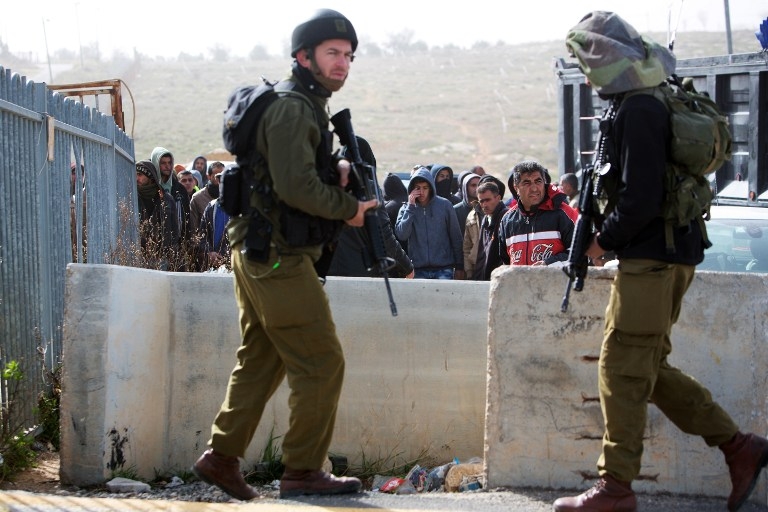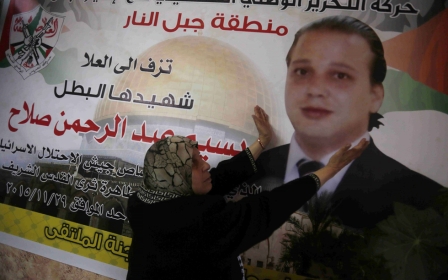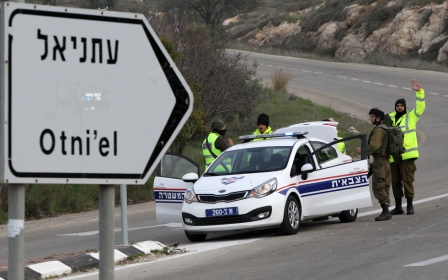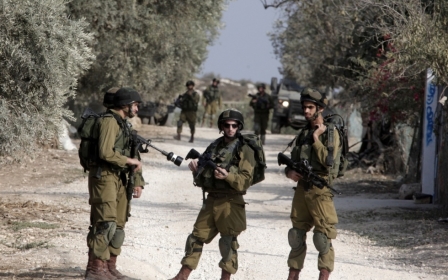13-year-old Palestinian girl 'shot dead by settlement guard': Israeli police

A 13-year-old Palestinian girl was shot dead by an Israeli guard at a West Bank settlement on Saturday in what Israeli police said was an attempted stabbing.
The apparent stabbing attempt at the Anatot settlement was the third reported incident at West Bank settlements in a week after a woman was stabbed to death in her home in Otniel last Sunday, and a pregnant woman was injured in a knife attack in Tekoa on Monday.
"A 13-year-old Palestinian girl with a knife in her hand ran toward the civilian security guard at Anatot [settlement]," Luba Samri, an Israeli police spokesperson, said in a statement. "The guard opened fire, gravely wounding her and medics pronounced her dead shortly afterward."
Samri told the Palestinian Ma'an news agency that the girl had been in a quarrel with her family in the Palestinian village of Anata before going to carry out the attack.
The news agency identified the girl as Ruqayya Abu Eid, citing the head of Anata's village council.
Her mother told Reuters that there was no family argument before Abu Eid left the house.
"Her father works in a farm and Ruqayya used to go to him," the mother said. "I didn't see her when she left so I expected she had gone to her father. Ruqayya is a small girl, how could she stab someone?"
The girl's father arrived at the scene to look for his daughter shortly after the incident and was detained by police for questioning, Ma'an said.
On Sunday a Palestinian teenager entered the southern West Bank settlement of Otniel and stabbed to death Dafna Meir, a 38-year-old nurse and mother of six, at her home.
Israeli Prime Minister Benjamin Netanyahu pledged that the alleged assailant's home would be demolished as a deterrent.
On Monday, a knife attack on a street in Tekoa, another West Bank settlement, wounded a 30-year-old pregnant woman. The alleged assailant was 17.
A total of 156 Palestinians and 24 Israelis have been killed in three months of attacks since 1 October. Most of the Palestinians killed were carrying out attacks and many of the assailants have been young people, including teenagers.
Police said initial investigations into Saturday's settlement incident showed that the girl left her home in a nearby Palestinian village, feeling suicidal after arguing with her family.
"She had a knife and intended to die," the statement said.
Most of the previous knife attacks occurred in public places, including checkpoints and junctions. They regularly result in the death of the alleged perpetrator.
The latest settlement attacks further boosted tensions after months of unrest, raising fears of an escalation in violence as well as a harsh Israeli crackdown on Palestinians.
Israeli military chief of staff Gadi Eizenkot told a security conference on Monday that a crackdown, such as new restrictions on Palestinian workers, could push more Palestinians toward violence.
"It would be a bitter mistake to impose curfews and closures," he said. "That would work against Israeli interests."
US ambassador Dan Shapiro on Monday condemned the stabbings as "barbaric acts of terrorism," but he also questioned Israel's policies concerning settlements in the West Bank.
The settlements are seen as major stumbling blocks toward peace efforts since they are built on land the Palestinians view as part of their future state.
"This government and previous Israeli governments have repeatedly expressed support for a negotiated settlement that would involve mutual recognition and separation," Shapiro told a security conference.
"Yet separation will become more and more difficult" if Israel continues to expand settlements, he said.
New MEE newsletter: Jerusalem Dispatch
Sign up to get the latest insights and analysis on Israel-Palestine, alongside Turkey Unpacked and other MEE newsletters
Middle East Eye delivers independent and unrivalled coverage and analysis of the Middle East, North Africa and beyond. To learn more about republishing this content and the associated fees, please fill out this form. More about MEE can be found here.




